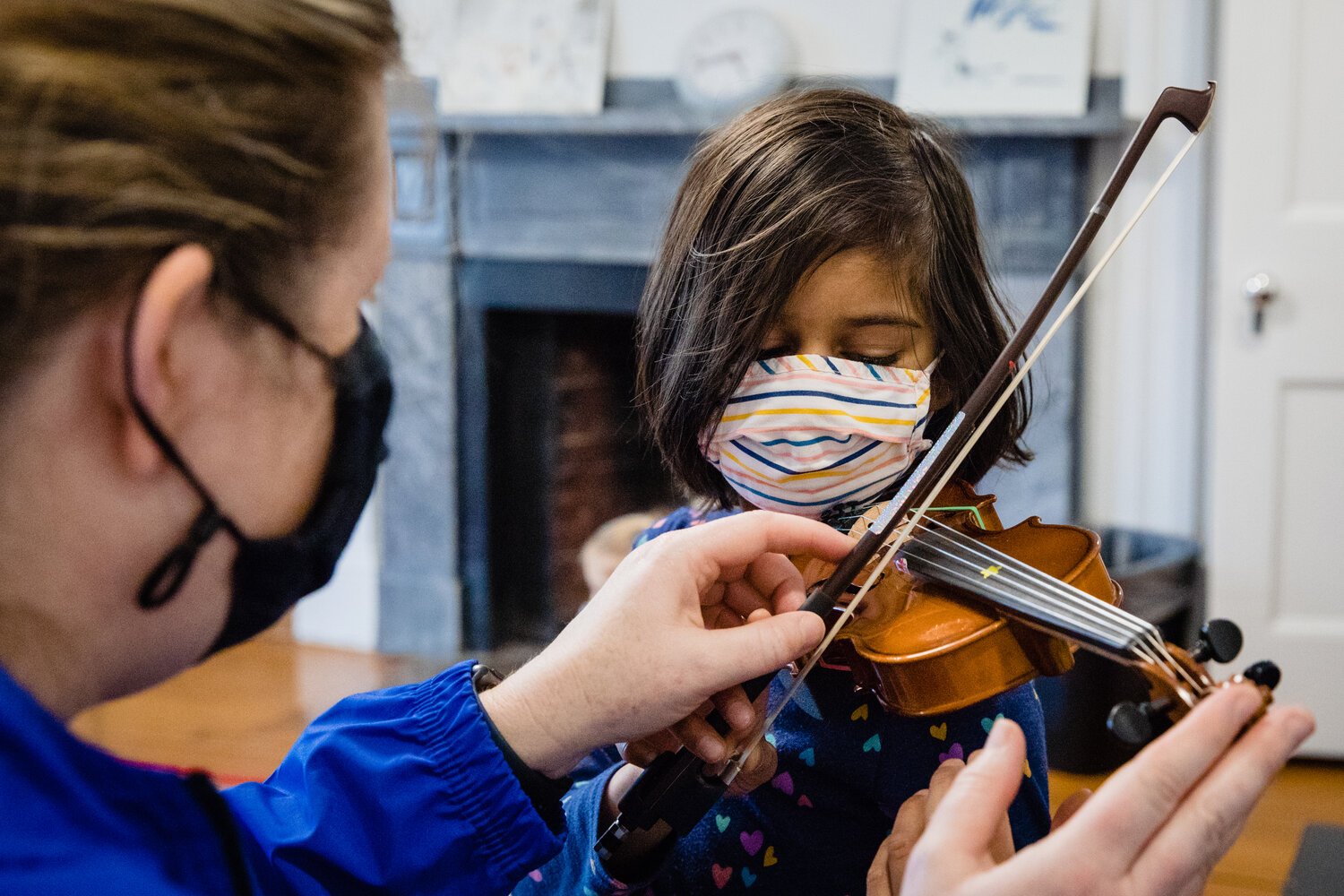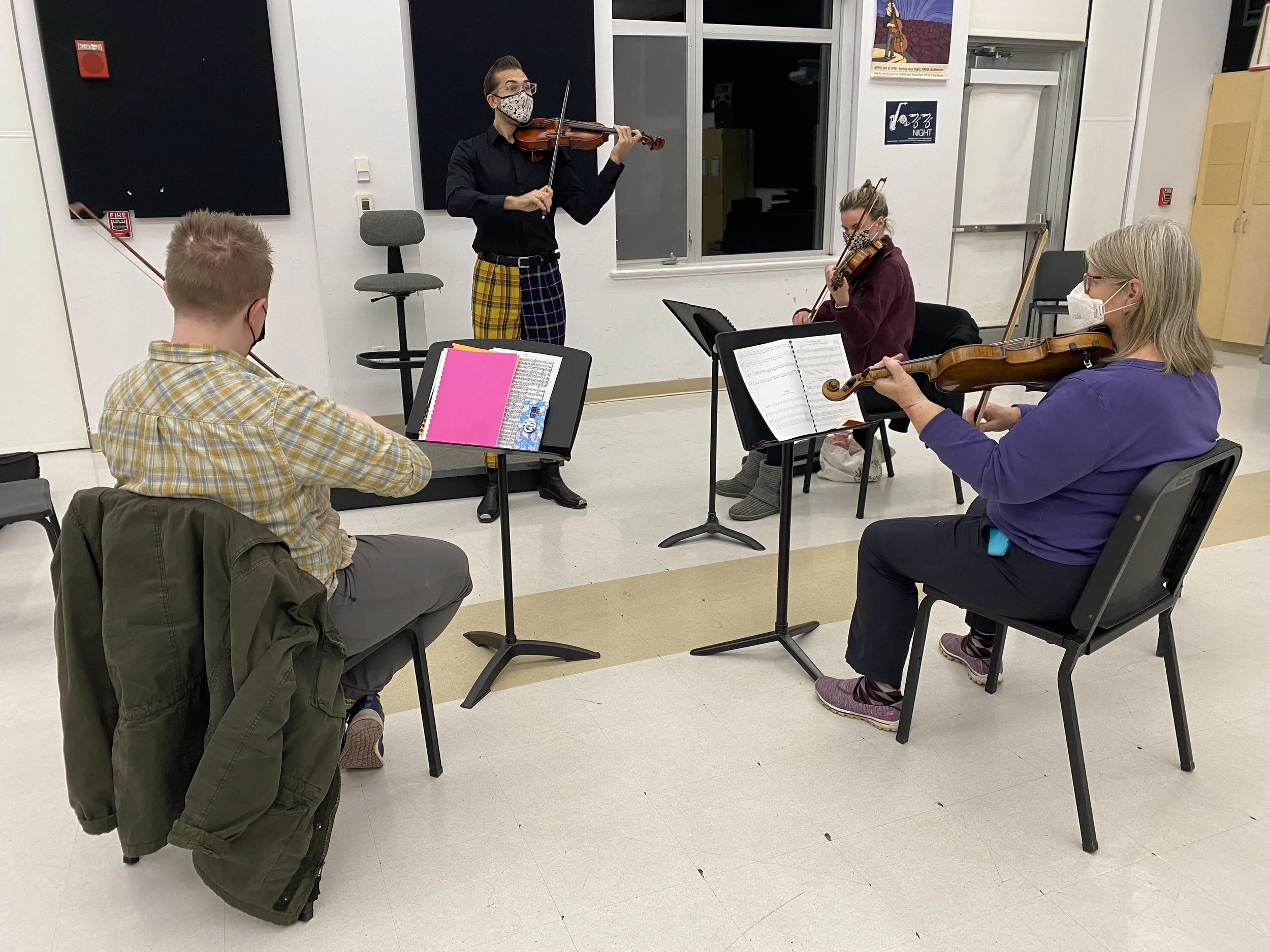Forgiveness
Teaching children to forgive themselves can be difficult. Children can easily be embarrassed and set high expectations of themselves. Our role is to continue to encourage them. Learning to try again at something that did not go well can be healing. In a world where people have high expectations, we all need to practice a little forgiveness.
Rehearsing for Life (12/15/23)
Performing does not come easily to everyone. In fact, performing can cause a lot of anxiety and stress. In our Suzuki community there is a priority to develop the heart of the child. We emphasize the process in learning, and preparing for a performance requires rehearsing. Mental preparation for the concert is part of the process and is a life skill that we teach through music. However, mental preparation, practicing, and rehearsing is developed as a life skill for any situation they may encounter---even as adults.
Practicing Silence (12/8/23)
As I was preparing a student for his solo this coming weekend, we talked about placing our hands in rest position and just thinking about the music. We also talked about placing our hands in the ready position and hearing the music inside our head. Finally, we talked about taking a breath before playing the piece. These three steps were a way to thoughtfully and mindfully prepare. It would create a moment of silence that would help the audience be prepared to listen. At the end of a piece, it is important to hold our position (arms in the air) while the final vibrations fade and count out the final rests in the last measure. These silences are very powerful and meaningful.
Are You a Musician? (12/1/23)
Art and learning take time. The creativity in music comes as a result of the discipline of the training. The expression we nurture through classical music comes from the discipline of playing skillfully and with the correct style of the piece of music. As many of you heard in the last faculty concert, our teachers are very creative. Whether it is a Brahms sonata or an improvisation made up on the spot, it took many years of training for them to arrive at this point of creativity. The achievements of our students are likewise the result of many hours (and years) of practice and support from teachers, parents and adult caregivers who value their music education. We want our students to identify themselves as intelligent, creative, and respectful human beings. We do this through our music and preschool instruction. The careful study, repetition, and performances build the student's identity in being a musician. We are so grateful for this community effort and commitment to music lessons that build the identity of the student as creative individuals and musicians.
Daily Dose of Gratitide (11/22/23)
In this Thanksgiving season, I want to thank all of you who make up our Suzuki School's community. I wish you all a wonderful Thanksgiving holiday and look forward to our continued and shared experiences around music and learning.
Seek Peace Daily (11/17/23)
Dr. Suzuki was inspired to teach music as a result of the devastations of World War II on the children of Japan. Nurturing children to learn how to make beautiful music, to be respectful of each other, and to learn how challenges can be overcome if taken step by step, is a great joy in being a Suzuki teacher. It is not just the music, but it is also "the music." Our work as Suzuki teachers gives us hope.
The Law of Energy (11/9/23)
The basic law of energy is that "energy is neither created nor destroyed." The concept of conservation of energy does not mean "to save" energy, but rather to convert energy from one form to another as efficiently as possible. Car engines that burn gasoline convert this chemical energy into mechanical energy that propels the car. Solar energy converts radiant energy into electrical energy. Our bodies burn food to provide energy for us to move, work, or play a musical instrument. Apparently the human body is very inefficient in this and most of the energy goes towards producing heat.
How Well Are Our Students Practicing? (11/3/23)
An important place to start is to understand what type of learner you and your child are. Some of us are methodical and love to create lists. We like to practice in the same order every day. We appreciate when our lessons follow the same ordered sequence each week. Some of us are more intuitive. We don't need to warm-up or do exercises. We just want to play. We want to invent our own music and reading from the music score is difficult. We may not understand what is actually on the page, and we only glance at it from time to time. There are some of us who can do anything the teacher asks when we are in the lesson. Then when we get home, we can't remember anything we did and so need a video or a parent to show us what we are working on. There are a multitude of scenarios, and there could even be a combination of these mixed together. It can be a dilemma in home practice if parent and student do not have the same learning style.
Halloween Safety (10/27/23)
We can take the topic of "rules" a step farther by saying that when we understand rules, we can play games together! The concept of rules is a moment of enlightenment to the four year old. Our preschoolers played "Red light, Green light" this week. What fun it is to play new games, but we must all learn the rules of playing the game. Children can learn chess and checkers when they learn the rules of how to make their "moves." Some of the most fun for older children and young adults is making up your own game and creating your own rules. For those that are familiar with the dramatic play surrounding an in-house "dungeons and dragons" game, creating rules on what super powers your character has and what constitutes earning points is part of the fun. Simply taking turns is part of the "rule" when learning to play new games.
Let’s Light a Fire! (10/20/23)
We ask that children listen to music every day because this is how we create an environment where beautiful music is normal. Unlike the match that sparks a flame, we prefer the slow burn. Constant, steady, and consistent attention to high quality and details lead us to believe, understand, and expect this in our own environment. We want all children to believe in themselves. They can learn to play beautiful music if encouraged and surrounded by listening to this quality music. It is a slow burn.
Happy Birthday, Dr. Suzuki! (10/13/23)
Next Tuesday, October 17th, would have been Dr. Suzuki's 125th Birthday. Although he passed away in 1998 just short of his 100th birthday, he was known for his vitality. He committed himself to daily practicing and teaching or attending daily lessons at his Talent Education Institute in Matsumoto, Japan. I went to Matsumoto to study at his school in 1993 and then went back to visit again in 1994. I learned in just a few minutes that Dr. Suzuki respected the humans around him, had a wonderful sense of humor, and had a positive energy that everyone could feel as he entered the room.
Living Through the Senses (10/6/23)
As we teach using the Suzuki method, we want our students to observe, hear, and feel the vibrations in the room. This is why we emphasize the importance of an acoustic piano over a digital piano. (The vibrations are different.) We try to minimize the amount of verbal instruction because this is limiting the primary experience of learning. Most importantly, being together in the same room allows children to learn more about body position, facial expressions, and read these important non-verbal cues
Movin’ to the Music (9/29/23)
Listening to music is key to the rich musical environment that Dr. Suzuki believed to be the basis for nurturing musicians. Infants have well-developed hearing at birth. So, it should not surprise us that, in just a few months, they stare up at caregivers when they hear music. They often smile, wave, kick, and wiggle to music before they are a year old. Before long, they are dancing and vocalizing when they hear a favorite often-repeated piece. Sometimes, I notice small audience members starting to giggle or shriek with laughter. We may not know what they are thinking, but we realize that they are already on the way to making their own music. Eventually, because they have learned about music in a natural way, they will successfully mimic the recorded pieces in the Suzuki repertoire.
The Art of Listening (9/22/23)
As Suzuki educators, we participate in training that emphasizes giving positive, specific feedback. For all who are involved in the Suzuki learning approach it is a difficult viewpoint to adapt because we are much more susceptible to observing what goes wrong.
New and Old (9/18/23)
The Suzuki pedagogy believes in everyone learning at their own pace. Suzuki teachers undergo extensive training to learn how to observe and teach at each student's level. As parents, you may not realize how much you are engaged in the learning process here. We want you to ask questions and be curious about how this all works! Most of all, we want parents to understand that their student's pace may be different from other children in the same class. Parents are an integral and equal partner with the teacher in making the learning experience positive
Working on Positive Feedback
As Suzuki educators, we participate in training that emphasizes giving positive, specific feedback. For all who are involved in the Suzuki learning approach it is a difficult viewpoint to adapt because we are much more susceptible to observing what goes wrong.
Play Together!
We were brought together to share in our belief that our children can learn, be creative, and be supportive of others--when given a positive environment. Making music together is very uplifting to our hearts.
Making Decisions
At the Suzuki School, we have a firm commitment to the process of learning and it is a journey in discovery.
Listen Everyday!
We share our feelings through music. When we perform in public, such as our Playathon and community performances, we share our humanity in this very important way.
The Parent Point Of View
The best meals are those in which we may linger at each course and enjoy the flavors and tastes of the meal with friends and family in an atmosphere of enjoyment and leisure. Music can have that same meaningful experience of parents and children, adults and partners, all learning together.



















